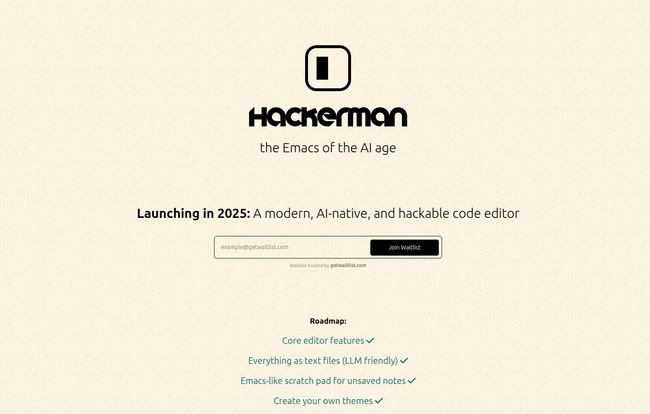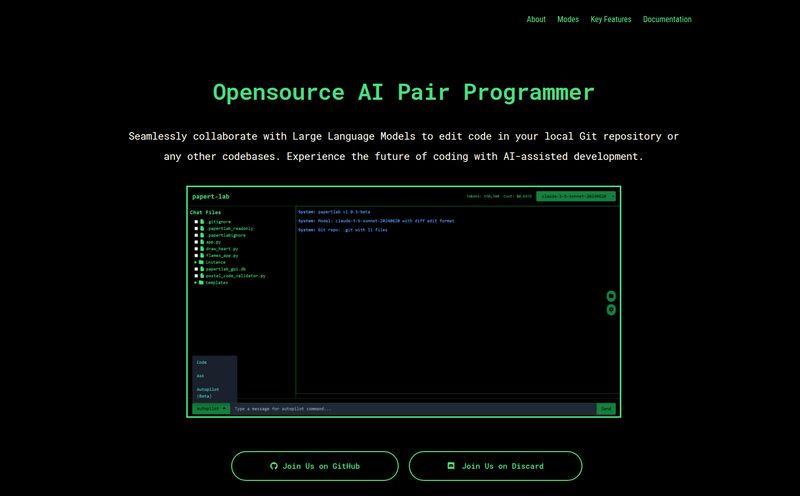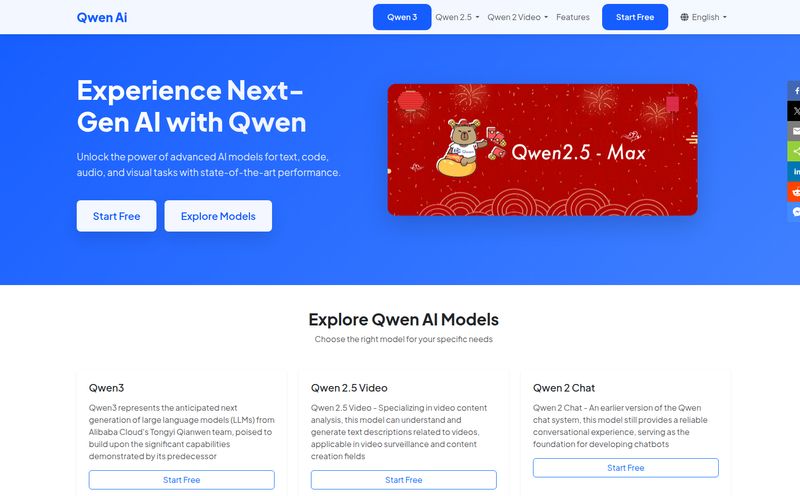I’ve been in the SEO and dev world long enough to see trends come and go. Remember when every tool was just 'add AI' and hope for the best? Most of it was just vaporware or a thin wrapper around an API. It got tiring. So, when I stumbled upon a new project calling itself "the Emacs of the AI age", my cynicism meter went up... but so did my curiosity. A lot.
That's a bold claim. For anyone who's been around the block, mentioning Emacs isn't just name-dropping; it's a declaration of philosophy. It's about infinite customizability, a tool that bends to the will of the user, a whole operating system masquerading as a text editor. So, for a new tool called Hackerman to invoke that spirit in the context of AI? Yeah, that got my attention.
But what I found was a little different than I expected, in a good way. It seems Hackerman is a project with two faces: what it is right now, and what it's aspiring to be. And both are pretty darn interesting.
What Exactly is Hackerman.AI? A Tale of Two Tools
From my digging, Hackerman isn't just one thing. It's a project in motion. It's a learning platform that exists today and a full-blown code editor on the horizon. Let's break it down.
The Practice Ground: Learning to Code with AI
First up is Hackerman.AI, the platform you can sort of use right now. It’s an innovative take on learning to code and prepping for those dreaded technical interviews. Forget just staring at problems on LeetCode. Hackerman.AI flips the script.
It uses AI to generate programs—mostly in Python for now—but leaves little gaps in the code, marked with `// TODO`. Your job is to fill in the blanks. It’s like learning a language by finishing sentences instead of just memorizing vocabulary. It forces you to understand the context, the flow, and the logic of the code around your little piece of the puzzle. If you get stuck, it gives you hints and explanations. It's a clever way to build that intuitive 'feel' for code that usually takes years to develop.
You can even paste in your own code, and it'll create a practice session out of it. Brilliant for solidifying something you just learned or for turning a complex work function into a personal kata. I’ve always believed that active recall is the best way to learn, and this is active recall for developers.

Visit Hackerman.AI
The Future Vision: A Truly Hackable, AI-Native Editor
This is where that "Emacs of the AI age" thing comes in. The landing page for Hackerman, launching in 2025, isn't for a practice tool. It's for a "modern, AI-native, and hackable code editor." This is the grand ambition. The roadmap they’ve laid out is, frankly, a dream for a certain type of developer. My type of developer.
It's not just about integrating AI chat like everyone else is doing. It's about rethinking the editor from the ground up to be AI-friendly. Things like having everything as text files, which is huge for letting Large Language Models (LLMs) easily understand and modify your entire setup. It’s about building a system where the AI isn’t a bolt-on feature but part of the fundamental architecture.
My First Impressions and The Features That Stand Out
Looking at the roadmap and the existing tool, a few things really pop. This isn't just another VS Code clone with a different color scheme. The creator, Michael Sjöberg, seems to have a very clear vision.
Here’s what’s already checked off on their public roadmap versus what's coming soon:
| Completed Features ✅ | Coming Soon 🚀 |
|---|---|
| Core editor features | Support for mix-and-match LLM models |
| Everything as text files (LLM friendly) | In-code access to shell, Python eval, and AI chat |
| Emacs-like scratch pad for unsaved notes | Bring your own lexer |
| Create your own themes | |
| Custom functions with keybindings | |
| Local LLM inference |
The one that made me sit up straight was Local LLM inference. In an age where we send every keystroke to some cloud server, the ability to run your AI models locally is a massive win for privacy, security, and offline capability. It’s a power-user feature, and seeing it checked off as 'done' this early tells me they are serious about their target audience.
Who is This Tool Actually For?
So who should be signing up for the waitlist? I see a few groups who should be genuinely excited.
- The Beginner Coder: The existing Hackerman.AI practice platform is a fantastic, low-pressure way to get your hands dirty. The 'fill-in-the-blanks' model is much more engaging than just copying code from a tutorial.
- The Interview Prepper: If you're grinding through algorithm problems, this tool offers a different way to practice. It helps you recognize patterns and understand code flow, not just memorize solutions.
- The Disenchanted Power User: This is the big one. If you feel like modern code editors have become too bloated, too restrictive, or too reliant on the cloud, Hackerman's philosophy will resonate with you. The promise of a truly hackable, local-first, AI-native editor is the holy grail for many of us.
It’s a tool that seems to want to grow with you. You can start by filling in the blanks, and one day, you might be writing your own extensions for the editor itself.
The Good, The Bad, and The Python-y
No tool is perfect, especially one that's still on the launchpad. So here's my honest take on the pros and the potential cons.
What's Got Me Excited
The core learning concept is solid. It's an effective and active way to improve your coding chops. But it's the future vision that has me hooked. The commitment to local LLMs, extreme customizability, and a text-based configuration feels like a return to the roots of what made tools like Emacs and Vim so powerful and enduring. It’s less of a finished cathedral and more of a box of incredibly powerful, AI-infused LEGOs. And I love LEGOs.
Potential Hurdles and Limitations
Let's be realistic. Right now, the practice tool is heavily focused on Python. That’s great if you’re in the Python ecosystem, but less so for JavaScript, Rust, or Go developers. I'm sure more languages are planned, but it's a limitation for now. Also, any AI-generated program will have its limits. It might not always create the most complex or nuanced problems, so it's a supplement, not a replacement for deep project work. And of course, the biggest 'con' is that the full editor isn't out yet! We're all just eagerly waiting for 2025.
What About The Price?
This is the million-dollar question, isn't it? As of now, there's no official pricing for the 2025 code editor. The waitlist is just that—a list to get updates. However, the existing practice tool does have a free option, though it might be limited by time or the number of generations.
My gut feeling? We'll probably see a freemium model. A generous free tier for basic use and to get people hooked on the philosophy, with a Pro or subscription tier that unlocks the most powerful features—perhaps more advanced local model support or priority access to new modules. Pure speculation on my part, of course.
The Final Verdict: Should You Join the Waitlist?
I feel like I’ve spent my career searching for the perfect development environment. I've jumped from Sublime Text to Atom to VS Code, always chasing a bit more speed, a bit more intelligence, a bit more... malleability. Each one got close but never quite felt like home in the way old-timers describe Emacs.
Hackerman might just be the first tool in a long time that's not just trying to be a better version of what we already have, but something philosophically different. It's aiming to give power back to the developer in the age of AI.
So, should you join the waitlist? If you're a developer who loves to tinker, who values privacy, and who believes a tool should adapt to you and not the other way around, then my answer is an unequivocal yes. I did. It might be nothing, or it might just be the start of the next great editor war. Either way, I want a front-row seat.
Frequently Asked Questions
- What is Hackerman.AI?
- Hackerman.AI is a dual-purpose platform. It currently functions as an AI-powered coding practice tool that helps you learn by filling in missing code snippets (TODOs). It is also evolving into a full-fledged, hackable code editor set to launch in 2025, described as "the Emacs of the AI age."
- Is Hackerman.AI free to use?
- The current practice tool has a free option, though it may have limitations on usage. Pricing for the upcoming 2025 code editor has not yet been announced.
- What programming languages does it support?
- The practice platform is primarily focused on Python at the moment. Support for more languages is anticipated for the full code editor release.
- How is Hackerman different from GitHub Copilot?
- GitHub Copilot is primarily an AI code completion tool that suggests code as you type inside your existing editor. Hackerman aims to be a complete, standalone code editor built from the ground up to be AI-native and highly customizable, including features like local LLM inference and a unique coding practice mode.
- When is the full Hackerman code editor launching?
- The landing page indicates a launch sometime in 2025. You can join the waitlist on their website for updates.
- What does "the Emacs of the AI age" mean?
- This is a reference to the classic text editor Emacs, which is legendary for its near-infinite customizability and extensibility. The tagline suggests that Hackerman aims to bring that same level of user control and 'hackability' to a modern editor designed specifically for the era of artificial intelligence.



